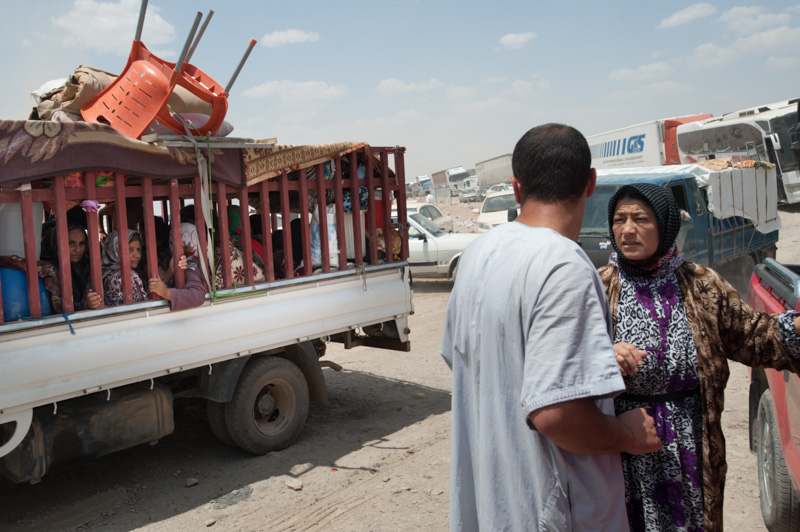CPTnet
5 August 2014
IRAQI KURDISTAN ANALYSIS: Questions about the Islamic
State in Iraq, aka ISIS, IS, DAASH
by Peggy Faw Gish
[Note: This release has been adapted
for CPTnet. The original, more
comprehensive piece is available on Gish’s blog.]
 |
|
| CPT has been monitoring the checkpoint into the KRG where tens of thousands of Iraqi Christians, Yazidi, Turkmen, Shabak and Shia have been fleeing ISIS advances. |
Many analysts of the current situation in Iraq had
predicted that the Islamic State of Iraq and SHAM (ISIS), renamed the “Islamic
State” (IS) a month ago by the group (and also called “DAASH” by the Kurds in
the KRG) would make a major offensive on Baghdad before the end of Ramadan.
Jessica Lewis, a former American military
intelligence officer with several years of service in Iraq, describes IS as
capable of both guerilla style warfare and conventional warfare, and predicts
it will attack soon, first the bases around the city and important government
buildings.
The Institute for the Study of War, a U.S.-based
think tank, which has been analyzing IS activity in Iraq, reports that the
coordinated suicide attacks conducted around Baghdad in predominantly Shia
areas on 19 July, demonstrate that ISIS has infiltrated highly coordinated
sleeper cells into the city. Their analysts predict that the coming attack will
likely be in the form of guerrilla and terrorist offensive, rather than a huge
conventional military assault. It would be intent on instilling chaos and fear
and keeping the Iraqi government focused on defending the capital rather than
mounting an offensive to retake Mosul and other captured territory.
Other journalists and local Kurdish Iraqis question
IS’s ability to attack Baghdad now, seeing that recent IS advances in Iraq have
slowed down but increased in Syria, where they are meeting stiff resistance,
and that they are engaged in current battles with Iraqi forces north of
Baghdad, trying to defend captured territory. Instilling fear and building a
reputation of fear seems an important strategy. A recent example is the video IS released (reported
by Reuters on 29 July) warning Iraqi soldiers to leave their posts and join
them, or face execution.
Kurdish and Iraqi news sources report almost daily
skirmishes between Kurdish Peshmerga and IS fighters, somewhere along the front
line between Kurdish controlled areas and IS-controlled areas. Deaths from
these battles are usually no more than a handful or two. So far, IS has not
taken any substantial areas held by the KRG, though they do control some of
Iraq’s oilfields and dams.
Thankfully, some of the earlier claims made about
IS’s demands and actions around the city of Mosul have proven to be false, such
as reports that the Islamic State had issued a fatwa ordering women to undergo
female genital mutilation (FGM) that the Islamic State had burned down the St.
Ephrem’s Cathedral in Mosul and that it had looted Mosul’s central bank.
This
false propaganda however, has been reported alongside real threats and
atrocities. Our team has seen the
effects IS’s threats and presence has had on the daily life of the people of
Iraq. Last week human rights
organizations in Iraq estimated that the number of people in Iraq displaced by
the crisis, reached 1,250,000 and is likely to rise.
Kurdish people we talk to in Suleimani are fearful IS
cells will infiltrate into the KRG with those displaced people coming in, and
worry as well about the economic strain from Syrian refugees and refugees from
other parts of Iraq pouring into the KRG.
“Of course, we are glad we may achieve an
independent Kurdish state,” a Kurdish man, Hawar*, recently told our team,
voicing some common sentiments held by Kurds in the KRG, “but we are also
afraid. We hear horrible things about DAASH. What if after they attack Baghdad,
they turn around and come up and attack us? Will we be able to fight them off? This is a
frightening time for all of us.”



